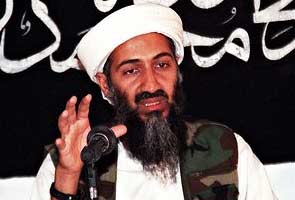
The Al Qaeda leader was identified by name by a woman believed to be one of his wives - bin Laden had several - who was present at his Pakistan compound at the time of the U.S. raid. He also was visually identified by members of the U.S. raid squad, a senior intelligence official told reporters at a Pentagon briefing. Under ground rules set by the Pentagon, the intelligence official and two senior defence officials could not be identified by name.
The intelligence official also said quite a bit of unspecified material was collected by U.S. forces during the raid. Without describing the material, the official said it is being analyzed by a team of people at the CIA.
The officials said bin Laden was killed toward the end of the firefight, which took place overnight Monday in a building at a compound north of Islamabad, the Pakistani capital. His body was put aboard the USS Carl Vinson and placed into the North Arabian Sea.
Traditional Islamic procedures for handling the remains were followed, the officials said, including washing the corpse, placing it in a white sheet. Preparations for at-sea burial began at 1:10 a.m. EDT Monday and were completed at 2 a.m. EDT, one official said.
The intelligence official said the DNA match, using DNA from several family members, provided virtual certainty that it was bin Laden's body.
Officials did not immediately say where or how the testing was done but the test explains why President Barack Obama was confident to announce the death to the world Sunday night. Obama provided no details on the identification process.
Dr. Bruce Budowle, a former senior scientist at the FBI, said DNA confirmation can be achieved quickly under the right circumstances.
Budowle, currently director of the Institute of Investigative Genetics at the University of North Texas Health Science Center at Fort Worth, said using a sample of blood or a cheek swab, "you extract the DNA that day, get the PCR done in the same day, put it on the machine that night... and interpret it the following day." PCR, or polymerase chain reaction, technology allows scientists to rapidly copy a single stretch of DNA using cycles of heating and cooling. Then it's a matter of adding fluorescent dyes to compare specific spots on that chunk of DNA with the relative's sample.
If markers on standard, well-known regions match, they have a positive identification.
The U.S. is believed to have collected DNA samples from bin Laden family members in the years since the 9/11 attacks that triggered the U.S.-led invasion of Afghanistan. It was unclear whether the U.S. also had fingerprints or some other means to identify the body on site.
Bin Laden was shot in the head during the firefight with members of an elite American counter-terrorism unit that launched a helicopter-borne raid on the Al Qaeda leader's compound, U.S. officials said. Officials said the U.S. Special Forces who stormed the compound came face to face with their prey.
U.S. officials also said bin Laden was identified through "facial recognition," a reference to technology for mapping unique facial characteristics, but it was not clear exactly how the Navy SEAL troops performed the comparison.
The body was photographed before being buried at sea, although no images have been released by the Obama administration.
The U.S. official who disclosed the burial at sea said it was not possible to find a country willing to accept the remains. Pressed by reporters to say which countries had been contacted about taking the remains, the official said, "I'm not going into details of those conversations."
Obama said the remains had been handled in accordance with Islamic custom, which requires speedy burial.
An official at Monday's Pentagon briefing said the body, once aboard the USS Carl Vinson, was washed and placed in a white sheet. It was then placed in a "weighted bag," and a military officer read prepared "religious remarks," which were translated into Arabic by a "native speaker" who was not further identified.
The body was then placed on a "prepared flat board, tipped up, whereupon the deceased's body eased into the sea," the official said.
Details on how the body was transported to the ship were not provided.
Positive identification of the remains is considered a critically important part of the U.S. operation, given the symbolic importance of bin Laden's leadership of the Islamic extremist movement that was based in Afghanistan until the U.S. invaded in October 2001.
When Al Qaeda's leader in Iraq, Abu Musab al-Zarqawi, was killed in a U.S. airstrike in June 2006, DNA tests were performed by the FBI to positively identify the remains. The U.S. military also performed an autopsy, in part to dispel allegations in the immediate aftermath of the airstrike that the terrorist leader had been beaten or shot by U.S. soldiers while in American custody.
It was not clear Monday whether the Obama administration intended to release its photos of bin Laden's body.
In July 2003, when U.S. forces killed Saddam Hussein's sons, Odai and Qusai, in a gunbattle in northern Iraq, the U.S. military released graphic after-death photographs in an effort to prove to Iraqis that they were dead. Two of the photos showed the first man, identified as Qusai, with bruises and blood spots around his eyes. That face was far more intact than the other, identified as Odai; the mouth was open with the teeth showing.


No comments:
Post a Comment